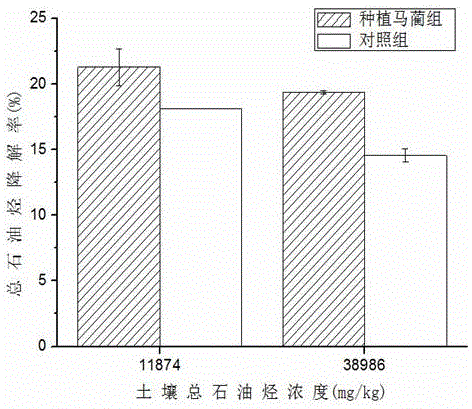A method for remediating oil-contaminated soil by using wild ornamental plant iris
A technology for ornamental plants and polluted soil, applied in the field of environmental restoration, can solve the problems of unreported wild ornamental plants and few researches on flower phytoremediation, so as to improve biodiversity, avoid secondary pollution, and beautify the environment
Active Publication Date: 2015-11-25
NANKAI UNIV
View PDF6 Cites 0 Cited by
- Summary
- Abstract
- Description
- Claims
- Application Information
AI Technical Summary
Problems solved by technology
However, there are few studies on flower phytoremediation under high concentration pollution, and there are no reports on the remediation of wild ornamental plants.
Method used
the structure of the environmentally friendly knitted fabric provided by the present invention; figure 2 Flow chart of the yarn wrapping machine for environmentally friendly knitted fabrics and storage devices; image 3 Is the parameter map of the yarn covering machine
View moreImage
Smart Image Click on the blue labels to locate them in the text.
Smart ImageViewing Examples
Examples
Experimental program
Comparison scheme
Effect test
Embodiment
[0017] A method for repairing petroleum hydrocarbon-contaminated soil by using the wild ornamental plant Iris japonica, using the absorption of the plant itself, the degradation of the rhizosphere microorganisms and their root exudates on the petroleum hydrocarbons, so as to achieve the purpose of degrading the petroleum hydrocarbons in the soil, and the specific steps are as follows:
the structure of the environmentally friendly knitted fabric provided by the present invention; figure 2 Flow chart of the yarn wrapping machine for environmentally friendly knitted fabrics and storage devices; image 3 Is the parameter map of the yarn covering machine
Login to View More PUM
 Login to View More
Login to View More Abstract
The invention discloses a method for restoring oil-contaminated soil by using wild ornamental plant iris lacteal. The method comprises the following steps of (1) planting the iris lacteal into petroleum hydrocarbon contaminated soil the mass concentration of which is 1%-4% by adopting ramet seeding, and watering in time to keep the soil water-holding capacity at 60% of water-holding capacity; (2) taking away the plant from the contaminated soil and planting the iris lacteal again when the plant achieves a mature period, or taking away an overground part of the plant to make sure the root of the plant to become a new plant, and repeating the planting process until the petroleum hydrocarbon content in the soil achieves a nation environmental standard or ecological safety index. The method disclosed by the invention has the advantages that the iris lacteal has certain tolerance and good restoring capacity on the low concentration and high concentration petroleum hydrocarbon contaminated soil, the operation is simple, the cost is low, the secondary pollution is not generated, the iris lacteal does not enter a food chain, a soil structure is improved, and the environment is beautified, so that the method is suitable for the restoring operation of large-area petroleum hydrocarbon contaminated soil.
Description
technical field [0001] The invention relates to an environment restoration technology of organic polluted soil, in particular to a method for repairing oil-polluted soil by using a wild ornamental plant iridium iris. Background technique [0002] In recent decades, with the advancement of industrialization, the exploration, exploitation and refining volume of my country's petroleum industry has continued to soar. According to statistics, 80% of China's oil comes from land oil fields, and the annual output of oil has exceeded 1000×108kg, and this value is still growing. Reference 1: Lin Xin, Li Peijun, Tai Peidong, etc. Oil polluted soil plants -Research progress of microbial remediation[J].Journal of Ecology,2006,25(1):93-100. However, while oil meets human needs, it also produces a lot of pollution. In the process of oil extraction, processing, maintenance, transportation and storage, crude oil will inevitably be produced, and oil spills, leaks, blowouts and other acciden...
Claims
the structure of the environmentally friendly knitted fabric provided by the present invention; figure 2 Flow chart of the yarn wrapping machine for environmentally friendly knitted fabrics and storage devices; image 3 Is the parameter map of the yarn covering machine
Login to View More Application Information
Patent Timeline
 Login to View More
Login to View More Patent Type & Authority Patents(China)
IPC IPC(8): B09C1/00
Inventor 程立娟周启星蔡章王亚男李晓晶张月勇
Owner NANKAI UNIV
Features
- R&D
- Intellectual Property
- Life Sciences
- Materials
- Tech Scout
Why Patsnap Eureka
- Unparalleled Data Quality
- Higher Quality Content
- 60% Fewer Hallucinations
Social media
Patsnap Eureka Blog
Learn More Browse by: Latest US Patents, China's latest patents, Technical Efficacy Thesaurus, Application Domain, Technology Topic, Popular Technical Reports.
© 2025 PatSnap. All rights reserved.Legal|Privacy policy|Modern Slavery Act Transparency Statement|Sitemap|About US| Contact US: help@patsnap.com


